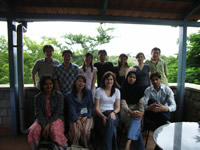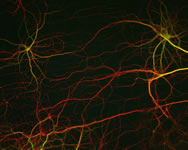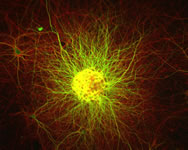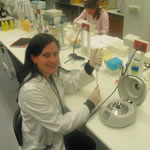|
Where did you grow up and go to school?
I grew up mainly in Launceston and went to St Patrick's College until the end of Year 10 and then Launceston College. I was accepted into the Bachelor of Biomedical Science course at the University of Tasmania, but then at the last minute decided to change to a Bachelor of Science, partly because I thought it would be fun to move to Hobart! I found the first year of uni quite tough though, it was difficult to adjust to the completely different style of teaching and learning compared with college. I persevered though, and each year it got easier. I finished up in 2000 with a Bachelor of Science majoring in Biochemistry.
 How did you become interested in science?
How did you become interested in science?
I don't really know when and how I became interested in science, none of my other family members was! I'm not sure if I should be admitting to this, but when I was 5 years old my friend and I would "dissect" snails in the garden. Then I received a toy microscope for my 10th birthday and I used to spend ages looking at samples under it - anything I could find, from tissue and fabrics, to leaves and insects, and even blood and skin! In Grade 6 I started to become influenced by television shows and decided being a forensic scientist would be a great job - a career I still might pursue one day.
 Where was your first job? Where was your first job?
After graduating I applied for was the Research Assistant position on the Jack Jumper venom immunotherapy trial run by the Emergency Department at the Royal Hobart Hospital, and to my complete delight and surprise I got it. The project was a really interesting and successful because of its relevance to the Tasmanian community. It was an overwhelmingly successful immunotherapy trial, which involved approximately 70 patients highly allergic to the venom in a Jack Jumper sting. If stung by a Jack Jumper these patients would normally go into anaphylactic shock, which is very dangerous. Over several months, patients received gradually increasing doses of the venom, which increased the tolerance of their immune system to the venom and by the end of the trial most did not have a bad reaction to the venom. Some aspects of the work were published in the highly prestigious medical journal, The Lancet. I was also able to complete my Honours degree based on my work in this project in 2002.
For a year I also worked in the Cytogenetics Laboratory of the Pathology Department at the hospital, where I was able to experience working in a diagnostic laboratory rather than a research laboratory. There I learnt about the normal way in which our DNA is organized into chromosomes, compared with in disease states such as leukaemia and genetic disorders such as Downs Syndrome.
 What's your current research about? What's your current research about?
I'm now doing my PhD with the NeuroRepair Group at the University of Tasmania. The theme of my research has been to compare specific aspects of the development of cells of the central nervous system (CNS), called neurons, with how more mature neurons try to respond to an injury, such as that which might be received in a fall or car accident. Neurons in the mature CNS are not normally very good at regrowing and re-establishing contacts that were lost during injury. But they are not completely incapable either, so we think that if we can understand neuron growth during development, it might help us to understand and develop therapeutic strategies to encourage the mature neurons to regenerate after injury.
After I complete my PhD I hope to eventually obtain a post-doctoral position in an overseas laboratory so I can expand on these techniques, and hopefully bring my new knowledge back to Australia.
What do you love about science?
Travel opportunities and the ability to work in practically any country in the world are among the great perks of science! I've been to meetings in the USA and India, where I not only learnt new techniques but was able to mix with young neuroscientists from all over the Asia Pacific region, and really got a taste of the Indian culture, which was fantastic. I also love the challenge of science. Basically what we do is decide on a question we think needs answering, and then work out how we are going to answer that question. You are always thinking, progressing with ideas and theories about why something is the way it is. You also get to do lots of work in the laboratory so you don't get bored of sitting at your desk working all day. On the other hand, it is also very demanding and competitive, and often hard to get things to work, so you cant let it get you down.

|
|
